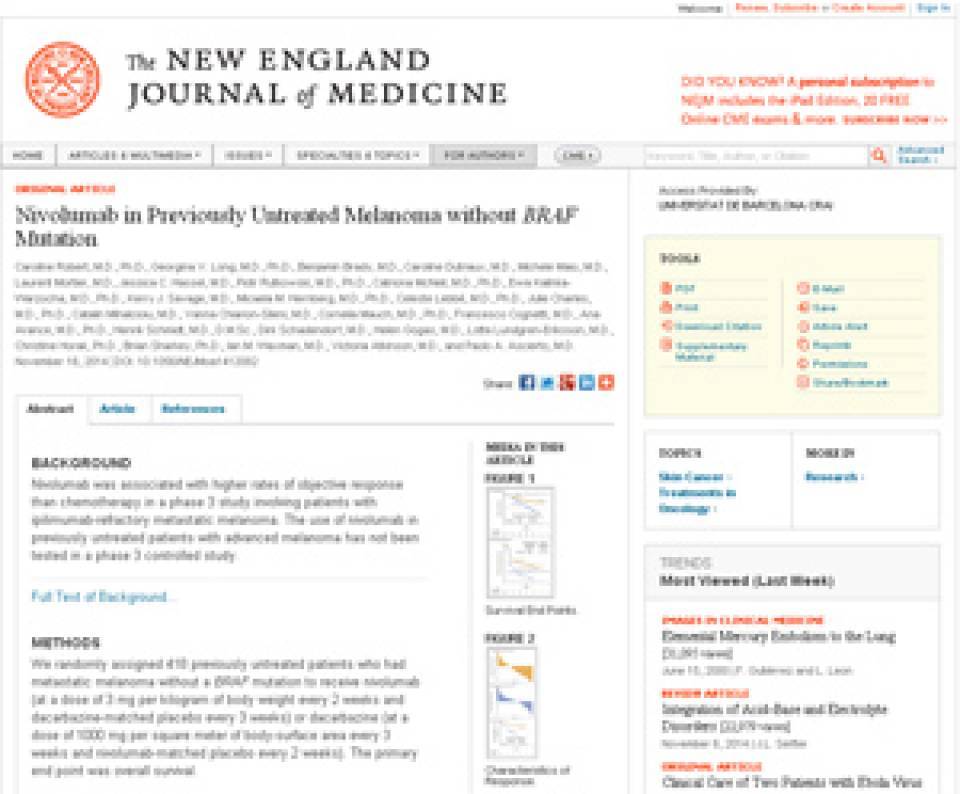The incidence of advanced melanoma increases every year, with 132,000 new cases worldwide, but therapeutic options are still very limited. Nivolumab is a monoclonal antibody directed against the lymphocytes receptor PD1, which restores an anti-tumor response mediated by the immune system. In addition to conventional chemotherapy, there are two inhibitors of the MAP kinases (MAPKs) cellular signaling pathway that have shown to be more effective in combination than administered alone in a study recently published in the NEJM in which Dr. Arance has also participated. However, this treatment is only effective in 40% of patients: those with metastatic melanoma with the BRAF V600E mutation, one of the most prevalent mutations in this tumor. This new study is focused in the 60% of patients with advanced and non-mutated melanoma for which treatment options are even more limited.
This multicenter and international study was conducted with 418 patients. They randomly received treatment with Nivolumab or the chemotherapeutic agent (Dacarbazine) which is used as a first line treatment for this cancer. The results show that the antibody increases patients’ survival compared to chemotherapy - 73% with Nivolumab vs. 42% with dacarbazine-, and so does the response to treatment 40% vs. 14 % respectively. The risk of death with this monoclonal antibody is reduced by 58% and the adverse events of the medication are fewer and less severe than with conventional chemotherapy.
Although this study focuses on patients with non mutated BRAF, previous studies have demonstrated the efficacy of the monoclonal antibody regardless of whether there are or not mutations in this gene. So, in the words of Dr. Arance, "given the magnitude of clinical benefits in patients, this new study will change the indication in the treatment of advanced melanoma."
Article Reference:
Nivolumab in Previously Untreated Melanoma without BRAF Mutation
Caroline Robert, M.D., Ph.D., Georgina V. Long, M.D., Ph.D., Benjamin Brady, M.D., Caroline Dutriaux, M.D., Michele Maio, M.D., Laurent Mortier, M.D., Jessica C. Hassel, M.D., Piotr Rutkowski, M.D., Ph.D., Catriona McNeil, M.D., Ph.D., Ewa Kalinka-Warzocha, M.D., Ph.D., Kerry J. Savage, M.D., Micaela M. Hernberg, M.D., Ph.D., Celeste Lebbé, M.D., Ph.D., Julie Charles, M.D., Ph.D., Catalin Mihalcioiu, M.D., Vanna Chiarion-Sileni, M.D., Cornelia Mauch, M.D., Ph.D., Francesco Cognetti, M.D., Ana Arance, M.D., Ph.D., Henrik Schmidt, M.D., D.M.Sc., Dirk Schadendorf, M.D., Helen Gogas, M.D., Lotta Lundgren-Eriksson, M.D., Christine Horak, Ph.D., Brian Sharkey, Ph.D., Ian M. Waxman, M.D., Victoria Atkinson, M.D., and Paolo A. Ascierto, M.D.
November 16, 2014DOI: 10.1056/NEJMoa1412082

